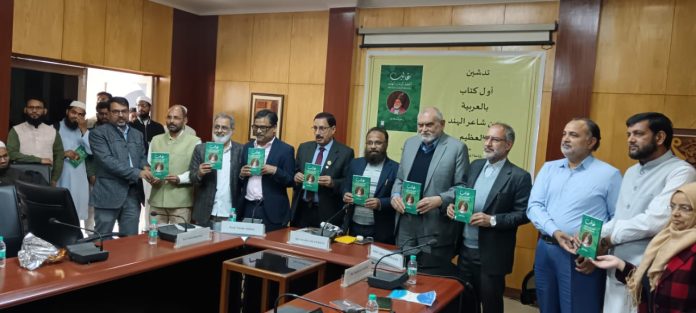New Delhi: The first Arabic book on the life and poetry of legendary Urdu poet Mirza Ghalib, titled Ghalib: A’zam Shu’ara’il-Hind (Ghalib, the Greatest Poet of India), was launched at the India-Arab Cultural Centre, Jamia Millia Islamia. The book is authored by Dr. Zafarul-Islam Khan.
The event was presided over by Professor Naseem Akhtar, Chairman of the Arabic Department at Jamia, and attended by eminent scholars, including Professors Habibullah Khan, Abdul Majid Qazi, Mohammad Ayub Nadwi, Fauzan Ahmad, Aurangzeb Azmi, Haifa Shakiri, Suhaib Ahmad, and Mahfuzur Rahman. Also present was Professor Mujeebur Rahman from JNU, alongside university faculty and students.
Professor Habibullah Khan lauded Dr. Khan’s efforts, calling him a distinguished translator and scholar recognized both in India and internationally. He emphasized that only a scholar of Dr. Khan’s caliber could accomplish the intricate task of translating Ghalib’s poetic essence into Arabic. He quoted Iqbal’s verses on Ghalib, which reflect his profound literary influence.
 Prof. Abdul Majid Qazi highlighted that Ghalib’s poetry continues to captivate people across generations. He pointed out the challenge of translating poetry, as linguistic and cultural nuances are often lost. However, Dr. Khan, with his deep-rooted literary background, has successfully introduced Ghalib to the Arabic-speaking audience.
Prof. Abdul Majid Qazi highlighted that Ghalib’s poetry continues to captivate people across generations. He pointed out the challenge of translating poetry, as linguistic and cultural nuances are often lost. However, Dr. Khan, with his deep-rooted literary background, has successfully introduced Ghalib to the Arabic-speaking audience.
Dr. Zafarul-Islam Khan, in his speech, reminisced about his long-standing association with Jamia and his early writings on Ghalib during his student days in Cairo. He stressed the importance of translation in bridging cultural and linguistic gaps, citing the enduring impact of Arabic translations like Kalila wa Dimna.
Professor Naseem Akhtar, who presided over the event, expressed pride in hosting the book launch, recognizing the significance of this first-of-its-kind Arabic work on Ghalib. He remarked on Ghalib’s unique poetic style, which blends traditional thought with exceptional expression.
This book marks a significant contribution to Arabic literature, bringing Ghalib’s timeless poetry to a wider global audience.




